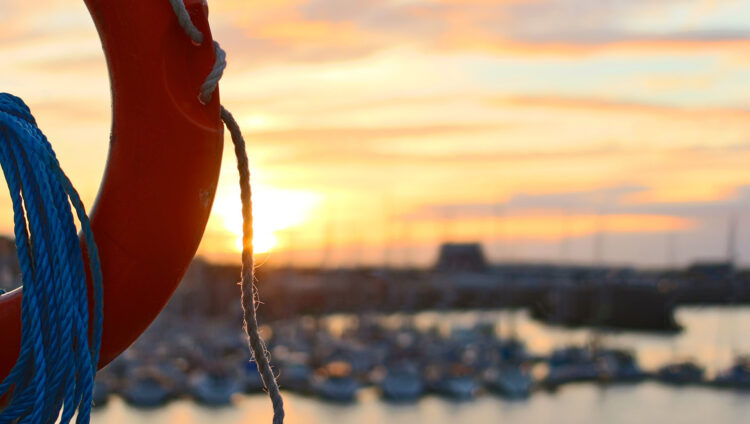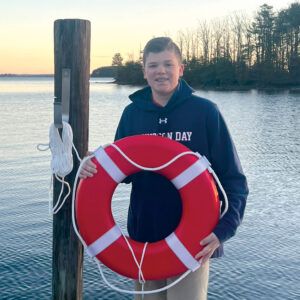
Feb. 7. By TL Bernthal. The Lake Norman Marine Commission education committee is working on a draft proposal that would require a life ring at every dock.
It’s early in the process, says commission Chairman David Scott, who personally supports the idea. The public can look for discussion and action in the coming months.
The regulation is being written by the commission’s education committee headed by Cornelius resident John Johnson, who also supports the idea.
Both say the idea, on its base level, has the support of the commissioners, but the devil is in the details. Details like a legal review, when and how to implement any plan to give people enough time to learn of the regulation and comply, penalties, enforcement and supply issues. No one knows exactly how many life rings would be needed and the supply available probably wouldn’t match a surge in immediate need.
Why now?
The idea of having life rings at waterfront public access points and on private docks to help struggling swimmers from drowning has been floating around Lake Norman without a push to make it law.

Johnson
“What has changed,” Johnson says, “is that it was a potential, then a person drowned. Potential became reality.”
Mateo Lopez went in the water behind a large home under construction on Brigadoon Lane in the late afternoon in October and drowned. The father of two drowned in front of a co-worker who couldn’t swim and couldn’t find a way to help him.
“We didn’t want it to happen a second time,” Johnson said.
Most members of the Lake Norman Marine Commission consider that drowning to be a call to action, Johnson said.
“The first-responders told us that if there was a life ring nearby, someone might have been able to toss it to him and save his life,” Elise Redmond, who lives on Brigadoon, said at the time.
Teen steps up to help
Those words resonated with Cade Redmond, 13, a Davidson Day eighth-grader and son of Elise. He and his family are spearheading and organizing the effort to get waterfront homeowners to voluntarily purchase a life ring and install it on their docks.

Cade Redmond, 13, and his family are spearheading the Float it Forward campaign
Cade calls it the Float it Forward campaign. So far, through his website (thedevoted float.com), more than 150 life rings have been sold.
“A lot of people have supported this campaign and helped in every way they can,” Cade said.
Cade says people tell him they never thought about putting a life saver ring on their dock because the rings are mostly found at pools and other public areas.
“You don’t know you need a life saver ring until something goes wrong,” Cade says. “It is a simple thing that can make a big difference.”
Cade’s mother and champion says his campaign will be spotlighted in Marina Dock Age, a national B2B magazine serving the U.S. waterfront facilities segment of the marine industry.
Johnson says the marine commission appreciates the Redmond family’s efforts to raise awareness of dock safety and the importance of having lifesaving equipment on docks.
“We all want to prevent a tragic event like this from happening again,” Johnson said.
And that means taking life rings installed at docks from voluntary to mandatory, he said.
Life rings work
The city of Chicago installed life rings along the Lake Michigan waterfront for the 2022 beach season and in July the new life rings saved a man struggling in strong waves. Three of his friends on a breakfront tried to pull him out out the water, but couldn’t. A witness grabbed a life ring and threw it. That was at least the second time the life rings had been used to save a person in risk of drowning.
The life rings are required by Illinois law.
Needed year-round
Johnson said his goal is to have a life ring regulation in place by the upcoming boating season. It could take awhile before it is fully implemented, though.
Johnson notes safety is a year-round issue. The water in Lake Norman during colder months is chilly enough to cause hyperthermia in a short time. Someone checking their boat during off-season or walking on a dock could fall in and be in trouble quickly.
A companion could toss a life ring and that could be a life saver, Johnson said.
“It would be good for it to be a state law,” Johnson said. Ladders on docks are a good idea, he said.
At the state level
State Sen. Vickie Sawyer, who represents District 34, including part of Cornelius, northern Huntersville and Iredell County, said she supports the safety measures of a life ring at every Lake Norman dock and requiring anyone being towed by a vessel or personal watercraft to wear a personal flotation device/life jacket.

Sawyer
But, Sawyer says, the task of regulating those activities falls to the Lake Norman Marine Commission, which the state created with the authority to govern safety issues on the lake.
She tried in her early years in the state Senate to address safety and boating issues on Lake Norman.
The central staff in Raleigh told her those were issues for the Lake Norman Marine Commission.
“I was going to change the world for Lake Norman, but I was stopped in my tracks,” Sawyer said.
Johnson, however, believes life rings on every dock could and should be a state law. He pointed to Sheyenne’s Law, signed into law in 2015 by North Carolina Gov. Pat McCrory. The law, which increased the charge for impaired boating to a felony, was passed in honor of teenager Sheyenne Marshall, who died in 2014 after being hit by a boat the Fourth of July weekend.
John R. Bradford III, representing the state’s 98th House District that includes Cornelius and parts of Mecklenburg County, said he supports both the life ring and personal floatation device for anyone being towed measures.
Bradford said he will work with local law enforcement, bill advocates and the Lake Norman towns to file legislation in the NC House.
“My approach will be a statewide bill, but if needed, can amend it as a local bill,” Bradford said.
The Cornelius 2023 legislative agenda includes a requirement that life rings be installed near private lake access points.
Personal floatation devices
Personal floatation devices, called PFDs, for children 13 and younger are required if a child is being towed as a water skier, wake boarder or riding in a tube.

Scott
Scott, the LKN Marine Commission chairman, said the commission is focusing on education with its Love Where You Lake campaign, on the overall issue that people of all ages should wear life jackets while participating in activities on Lake Norman.
“We all know the reason most people die on the lake is no PFD,” Scott said.
Scott said he hopes the older teens and adults will learn the importance of wearing a life jacket when being towed, and put on a PFD.
The marine commission has supplied police departments with PDFs that could be loaned to boaters, Scott says, and SeaTow offers PFDs through a loaner program. The North Carolina Wildlife Resources Commission puts loaner PDFs at many launch points for boaters to use and return.
Drownings on the lake are “infinitely preventable,” Johnson said.




